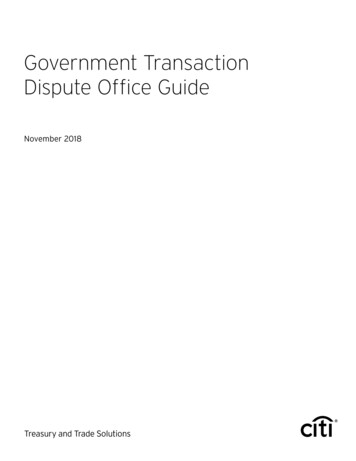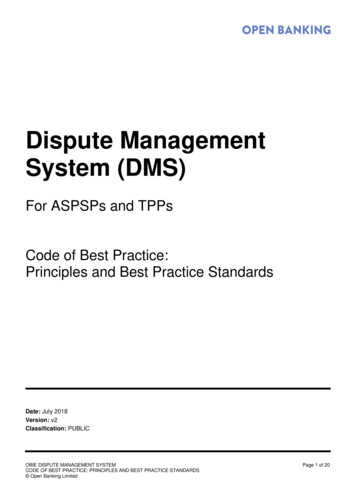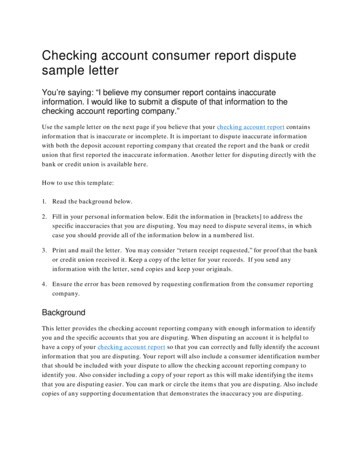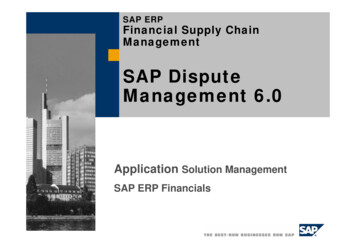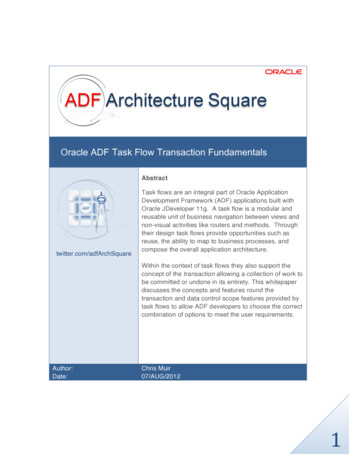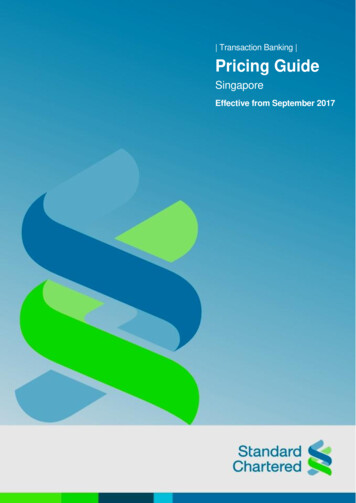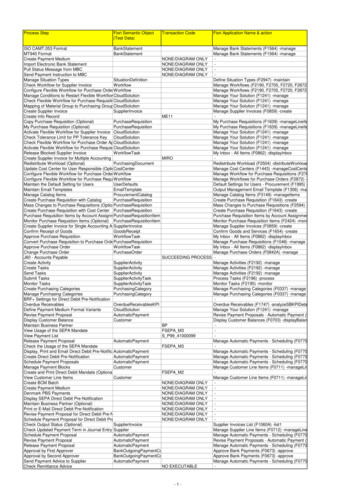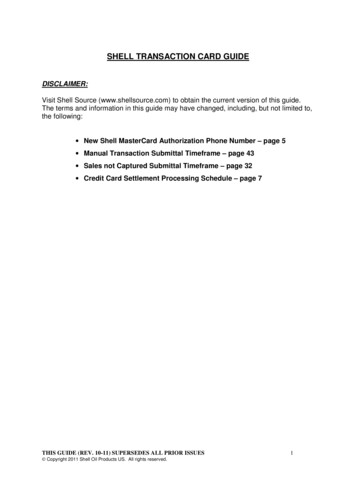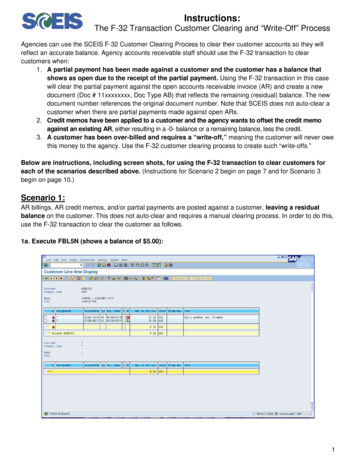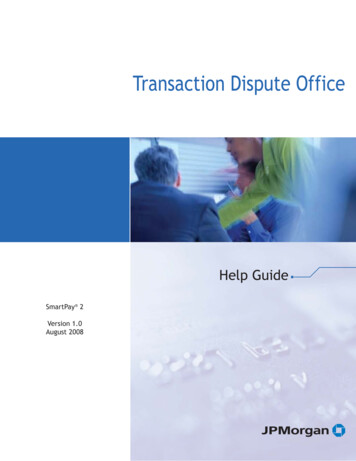
Transcription
Transaction Dispute OfficeHelp GuideSmartPay 2Version 1.0August 2008
S T R I C T LYP R I VAT EA N DC O N F I D E N T I A LConfidentiality Clause and DisclaimerThis Guide contains information that is confidential and proprietary to JPMorgan Chase Bank, N.A. This Guidemay only be used in connection with the transition and ongoing management of your Government Card programand may not be disclosed to any person or entity outside of your agency/organization without the prior writtenconsent of JPMorgan.
S T R I C T LYP R I VAT EA N DC O N F I D E N T I A LTable of ContentsRoles and Responsibilities . 1Transaction Dispute Procedures . 5The Electronic Access System Transaction Dispute Process .12Contact Information .16
S T R I C T LYP R I VAT EA N DC O N F I D E N T I A LRoles and ResponsibilitiesJPMorgan is committed to employing the tools, technology and processes necessary tosafeguard against unauthorized usage, fraud or identity theft. To facilitate these efforts wehave assembled a group of highly trained representatives, many of whom operate in a “behindthe-scenes” capacity to support your program.Outlined in the section below is a description of the following: Your JPMorgan team The roles and responsibilities of the JPMorgan team The roles and responsibilities of the Transaction Dispute OfficeJPMorgan TeamRelationship ManagerThe Relationship Manager serves as the primary contact for A/OPCs. The Relationship Managerwill support the agency throughout the life of the program — beginning by participating on allinitial calls, on-site visits, project planning sessions and training initiatives associated with taskorders. The Relationship Manager will be an advocate for agencies/organizations and will bethe main communication channel between the agency/organization and the JPMorgan Programand Project Manager.Additional Relationship Manager responsibilities include: Answering the A/OPCs’ day-to-day questions Monitoring program performance Identifying opportunities to refine your program and enhance its value Working with your program management team to ensure the program is meeting long-term goals1
S T R I C T LYP R I VAT EA N DC O N F I D E N T I A LProgram CoordinatorsProgram Coordinators work in conjunction with the Relationship Manager, providing daily helpdesk support to your A/OPCs at all levels of the Government Card program.Program Coordinators support the daily operational needs of the agency and have expertise insupporting government accounts. Program Coordinators provide assistance with the following: Transaction authorizations Specific charge inquiries Lost/Stolen card reports Electronic access system related questions Payment information Account closures Statement questions Cardholder issues Emergency services Changes to card controls Balance inquiriesBecause the Program Coordinator’s team consists of individuals who are dedicated to workingwith program management, they do not take inbound cardholder calls.2
S T R I C T LYP R I VAT EA N DC O N F I D E N T I A LAdditional Support ServicesDispute DepartmentThe Dispute Department supports the process of disputing transactions that have beenidentified as questionable, either as a result of a merchant billing discrepancy or fraudulentcharge. Responsibilities typically include: Working with merchants to research disputes Working with agency/organization stakeholders to resolve disputes Assisting cardholders with questions related to disputed transactionsFraud DepartmentThe Fraud Department actively monitors worldwide fraud patterns and maintains a system andstaff that compares activity on individual accounts against known fraud patterns. If an accountis suspected of being compromised, a member of our fraud department will contact thecardholder to verify the account activity. Additional responsibilities may include: Initiating investigations and recovery efforts Processing of required forms (i.e., affidavit, dispute form) Assisting cardholders with questions related to fraudulent transactionsCardholder Customer ServiceDomestic and international cardholders may seek live help from our Customer Service at twoU.S.-based dedicated card call centers. Customer Service is available 24 hours a day, sevendays a week, 365 days a year.Customer Service provides support for a wide range of services including: Lost/Stolen card reports Transaction authorizations Specific charge inquiries Card activation Replacement cards Account closures Statement questions Balance inquiries Emergency services Password reset assistancePlease refer to the Contacts section for telephone and address information.3
S T R I C T LYP R I VAT EA N DC O N F I D E N T I A LTransaction Dispute OfficeThe Transaction Dispute Office generally serves as the point of contact for disputingtransactions on central bill invoices.Responsibilities typically include: Overseeing program/cardholder adherence to dispute process policies and procedures Reporting disputed transactions to JPMorgan in a timely fashion Working with JPMorgan to resolve disputed transactions Tracking disputed transactions Ensuring that any personnel/responsibility changes in the Transaction Dispute Office areprovided to the A/OPC in a timely fashion Analyzing and monitoring JPMorgan reports on disputed transactions Providing feedback to the A/OPC on JPMorgan performance Participating in annual training conferences and disseminating to the agency/organizationinformation learned4
S T R I C T LYP R I VAT EA N DC O N F I D E N T I A LTransaction Dispute ProceduresIt is critical for cardholders to review their activity for erroneous charges. If a cardholderidentifies a questionable charge, they will need to determine if it is the result of a billingdiscrepancy or a fraudulent charge.The following section outlines the process for handling both types of erroneous charges.How to Determine if a Charge is a Billing Discrepancy or a Fraudulent ChargeBilling DiscrepancyThe following criteria are typically used to define an erroneous charge as a billing discrepancy: A transaction that the cardholder cancelled, but which was processed by the merchantanywayA transaction that is not recognized, but is from a merchant with whom the cardholder orthe agency/organization regularly conducts businessA transaction for which the cardholder has a receipt, but the amount on the receipt and theamount posted to the card account do not match Duplicate transactions (i.e., same merchant, amount and date) Returned merchandiseFraudThe following criteria are typically used to define an erroneous charge as fraudulent: A transaction that is not recognized, and is from a merchant whom the cardholder or theagency/organization does not conduct business A transaction on a lost or stolen card Suspicious activity5
S T R I C T LYP R I VAT EA N DC O N F I D E N T I A LHow to Handle Billing DiscrepanciesThe following outlines the process the cardholdershould follow to address a billing discrepancy on anaccount.1. Cardholder contacts the merchant directly andattempts to resolve the matter by determining ifthe questionable charge is a result of a billing error.Contacting the MerchantMost billing discrepancies can beeasily and quickly resolved bythe cardholder contacting themerchant directly.2. If the cardholder is not able to resolve theissue with the merchant, the cardholder shouldimmediately complete a dispute form and submitit to JPMorgan electronically through our electronic access system or by hard copy (mail orfax). Dispute form address and fax information is provided in the Contacts section of thisguide.3. In many cases, the dispute inquiry can be resolved during the initial contact with adispute representative. Common first contact resolutions include: A merchant credit may be posted to the account.The dispute representative may have additional information that resolves the dispute forthe customer.The dispute representative may contact the merchant initiating a three-way consultationin an attempt to resolve the issue.4. If the dispute is not resolved on initial contact, thedispute representative will begin the formal disputeprocess by engaging the acquiring center and mayask the individual initiating the dispute to providefollow-up information.Average Resolution TimeMost disputes are resolved within60 days of the date the request isreceived.6
S T R I C T LYP R I VAT EA N DC O N F I D E N T I A LHow to Initiate a DisputeThe following outlines the process for submitting adispute through the JPMorgan electronic access system:1. Complete the on line dispute form available throughthe JPMorgan electronic access system.2. The cardholder will receive a confirmation emailimmediately upon submission.Online Dispute FormUsing the dispute form availablethrough the JPMorgan electronicaccess system will help expeditethe dispute process.3. The dispute is automatically routed to theJPMorgan Dispute Department for processing.The cardholder will be notified if additional documentation is needed.4. Once the dispute is resolved, an additional notification email is sent to the cardholder.An Approving Official or other authorized third party can initiate the dispute in cases where: They have knowledge of the dispute They can provide the necessary supporting documentation The transaction is not being claimed as fraudlent or unauthorized7
S T R I C T LYP R I VAT EA N DC O N F I D E N T I A LCardholders can also opt to complete a hard copy dispute form and submit it to JPMorgan.Dispute form address and fax information is provided in the Contacts section of this guide.FormSample Dispute Form8
S T R I C T LYP R I VAT EA N DC O N F I D E N T I A LDocumentationOutlined in the chart below are the common types of documentation that a cardholder may beasked to provide as part of the dispute process.Dispute ReasonDocumentationCardholder billed for an incorrectamountCopy of receipt that shows correct amountCardholder returned merchandise,but merchant did not credit accountCopy of receipt from merchant that shows merchandise credit was issuedCardholder charged for a purchasethat was paid for by other meansCopy of documentation showing the other method of payment: cashreceipt, copy of check, copy of other credit card statement, etc.Time FramesThe following are key time frames and aspects of the dispute process:1. Cardholders have 90 days from the date the transaction was processed to notifyJPMorgan of a disputed transaction.2. JPMorgan will post a temporary credit to the cardholder’s account while the dispute isprocessed.3. If the dispute is resolved in the merchant’s favor, a debit transaction which reverses thetemporary credit will be posted to the account. The amount of the dispute will be addedback into the balance due on subsequent statements.4. If the dispute is settled in the cardholder’s favor, the temporary credit will remain on theaccount.5. Cardholders will receive a written communication stating the resolution of the dispute(i.e., resolved in favor of the merchant or cardholder).6. A cardholder can look at their JPMorgan billing statement to identify the total dollar amountof the transactions that have been put in dispute status.9
S T R I C T LYP R I VAT EA N DC O N F I D E N T I A LFraud1. Cardholders who identify potential fraudulent transactions on their statement shouldimmediately notify JPMorgan Customer Service by phone to report the card as lost or stolen,as well as follow any additional policies and procedures outlined by their internalagency/organization.2. JPMorgan will work with the cardholder to verify account activity and may either block orcancel the compromised account and issue a new card if necessary.3. The account will then be referred to the JPMorgan Fraud Department who will work withthe cardholder to review the transactions and complete an investigation of the suspectactivity. Cardholders may be asked to complete an affidavit detailing any fraudulenttransactions.Time FramesThe following are key aspects and time frames forhandling fraudulent transactions: JPMorgan must be immediately notifiedvia phone in cases where: A cardholder has identified an unrecognizedtransactionNotifying JPMorganImmediate action on the partof the cardholder may help toexpedite the fraud investigationand limit unauthorized activity.A card is lost, stolen or missingJPMorgan Fraud Monitoring SystemJPMorgan uses sophisticated security technology tomonitor transaction activity.If an account is suspected of being compromised, amember of our Fraud Department will contact thecardholder to verify the account activity.In some cases, we may place a “referral” status on acard that is suspected of being used fraudulently. Thiswill prompt any merchant who may be given the cardto contact JPMorgan. The cardholder’s identity will beverified, the referral status will be removed and thetransaction will be approved.Keep the Card SecureA cardholder does not need tolose the actual plastic associatedwith an account in order forthe account number to becompromised. Keeping cards anddocuments in a secure locationshould be a standard practice forall cardholders.If contact with the cardholder cannot be made, we may also try to contact the A/OPC.10
S T R I C T LYP R I VAT EA N DC O N F I D E N T I A LMinimizing RiskThe following guidelines will help your agency’s/organization’s cardholders minimize the risk offraud:1. Protect your Government Card Know where your card is at all times.Note the expiration date on your card and be aware if you do not receive a new cardrelative to that date.Be aware of when your statements should arrive, if late contact JPMorgan CustomerService.Sign the back of your card immediately upon arrival. This can and should be done p
safeguard against unauthorized usage, fraud or identity theft. To facilitate these efforts we have assembled a group of highly trained representatives, many of whom operate in a “behind-the-scenes” capacity to support your program. Outlined in the section below is
